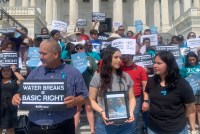Latest KFF Health News Stories
As Foundation for ‘Excited Delirium’ Diagnosis Cracks, Fallout Spreads
Major policy changes and disavowals have made this a watershed year for curbing the use of the discredited “excited delirium” diagnosis to explain deaths in police custody. Now the ripple effects are spreading across the country into court cases, state legislation, and police training classes.
Dodging the Medicare Enrollment Deadline Can Be Costly
As open enrollment ends, many people are tuning out. They could wind up with a surprise next year: higher costs and less access to health care providers.
‘Forever Chemicals’ Found in Freshwater Fish, Yet Most States Don’t Warn Residents
At least 17 states have issued PFAS-related fish consumption advisories, KFF Health News found. But with no federal guidance, what is considered safe to eat varies significantly among states, most of which provide no regulation.
Extra Fees Drive Assisted Living Profits
The add-ons pile up: $93 for medications, $50 for cable TV. Prices soar as the industry leaves no service unbilled, out of reach for many families.
Facing Financial Ruin as Costs Soar for Elder Care
The United States has no coherent system of long-term care, leading many to struggle to stay independent or rely on a patchwork of solutions.
A New RSV Shot Could Help Protect Babies This Winter — If They Can Get It in Time
Supply problems, a high price tag, and bureaucratic obstacles are slowing the distribution of a therapy that can protect infants from the respiratory syncytial virus. That will leave them unnecessarily at risk of hospitalization this winter, pediatricians fear.
As Transgender ‘Refugees’ Flock to New Mexico, Waitlists Grow
As many states have moved to restrict or ban gender-affirming care for trans people, a few states, including New Mexico, have codified protections. But those laws don’t always mean accessing care is simple or quick, as a surge in new patients in the state collides with limited doctors and clinics.
Start Shopping: Enrollment Begins Nov. 1 for Most Obamacare Insurance Plans
More than 16 million Americans who buy their own health insurance through state and federal marketplaces have until Jan. 15 to compare prices, change their coverage, or enroll for the first time.
Storing Guns Away From Home Could Reduce Suicides, but Legal Hurdles Loom
Safe storage maps show gun owners where to put their firearms for safekeeping if they experience a mental health crisis. The idea has support among some gun enthusiasts, but legal obstacles threaten wider adoption.
Quick Genetic Test Offers Hope for Sick, Undiagnosed Kids. But Few Insurers Offer to Pay.
A new, rapid genetic test shows promise in increasing diagnoses and improving treatment for some children with rare genetic conditions. Many insurers won’t cover it, but Florida’s Medicaid program is among those that see benefits — and, potentially, savings.
Pruebas genéticas rápidas a bebés pueden salvar vidas, pero muchas aseguradoras no las cubren
Que Medicaid cubra la prueba puede expandir significativamente el acceso para los bebés; el programa de salud federal gerenciado por los estados que asegura a las familias de bajos ingresos y que cubre a más del 40% de los niños en su primer año de vida.
She Received Chemo in Two States. Why Did It Cost So Much More in Alaska?
A breast cancer patient who received similar treatments in two states saw significant differences in cost, illuminating how care in remote areas can come with a stiffer price tag.
Massive Kaiser Permanente Strike Looms as Talks Head to the Wire
Both sides, still at loggerheads over pay and staffing, agreed to keep bargaining after unions announced a possible strike Oct. 4-7. If no deal is reached, a walkout by about 75,000 KP workers in five states could disrupt care.
Social Security Overpays Billions to People, Many on Disability. Then It Demands the Money Back.
Beneficiaries in five states described what happened when they received letters calling on them to return overpayments that can reach tens of thousands of dollars or more.
No existen normas federales para proteger a los trabajadores cuando los días son excesivamente calurosos. Y sin el apoyo bipartidista del Congreso, incluso con la atención urgente de la administración Biden, es posible que el alivio no llegue en años.
Workers Pay the Price While Congress and Employers Debate Need for Heat Regulations
Studies suggest official numbers vastly underestimate heat-related injuries and illness on the job. To institute protections, the government must calculate their cost — and the cost of inaction.
More Cities Address ‘Shade Deserts’ as Extreme Heat Triggers Health Issues
Where trees are growing — and who has access to their shade — affects health and well-being, especially in one of the hottest states in the country.
A New Medicare Proposal Would Cover Training for Family Caregivers
The federal government is proposing having Medicare pay professionals to train family caregivers how to perform tasks like bathing and dressing their loved ones, and properly use medical equipment.
Texan Activists Thirst for a National Heat Standard to Protect Outdoor Workers
As much of the U.S. faces extremely high summer temperatures, Texas’ Republican governor, Greg Abbott, has taken steps that effectively eliminate mandated water breaks for construction workers. In response, protesters from the Lone Star State came to Washington, D.C., to press for federal protections for such outdoor workers.
With More People Giving Birth at Home, Montana Passed a Pair of Laws to Make It Easier
The state now requires Medicaid to cover midwife services and has expanded the list of prescription drugs midwives can administer.
























